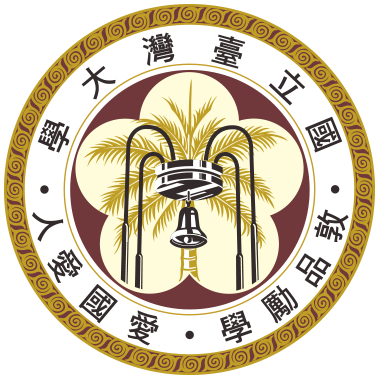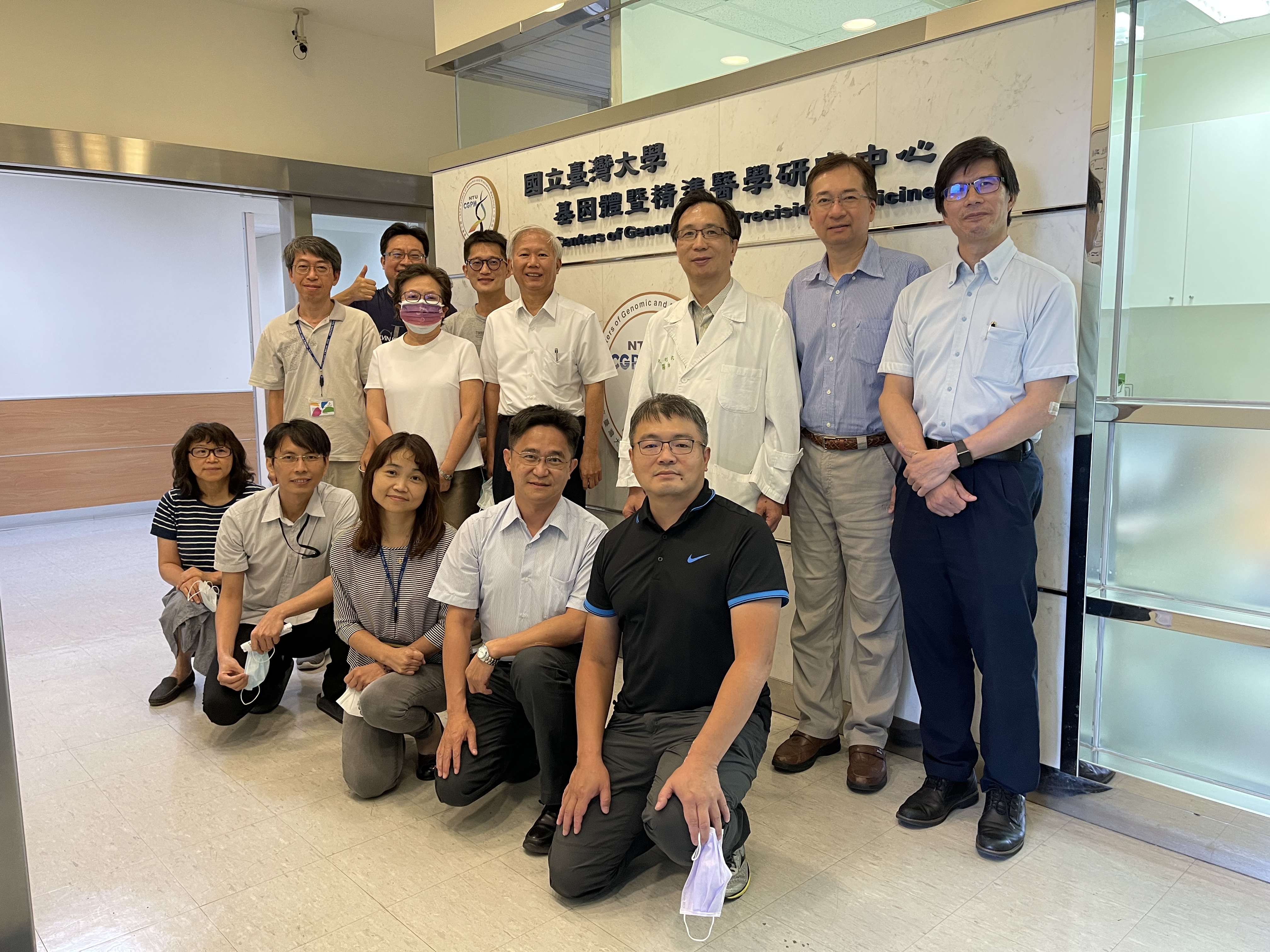NTU Centers of Genomic and Precision Medicine (CGPM) is committed to contributing abundant research achievement to our society. The primary feature of CGPM is the platform-based integration of basic research and clinical studies in translational medicine, in conjunction with the momentum of NTU’s medical system and the biomedical industry. Under the COVID-19 pandemic, CGPM actively participates in topics related to policy development and clinical treatment. It pioneers to work on SARS-CoV-2 whole genome sequencing and phylogenetic analysis, in order to identify the possible origins and transmission pathways of the viral strain.
Let's join Office of International Affairs for a virtual tour to CGPM and unveil its mystery together!
About CGPM
CGPM leverages multiple omics research methods to address three unmet medical needs: Infection Disease , Stress Biology , and Cancer. It aims to reduce incidence rates and fatality rates in infectious diseases and cancers, and propose targeted treatment plans for individual or racial variations. With resources and expertise in multiomics, bioinformatics, and structural biology, CGPM has formed a solid scientific platform with cross-border academic collaboration.
Features
The core labs cover about 11,570 square meters. With core labs and biomedical resources, CGPM is a top research center integrating translational medicine and multiomics in Taiwan. While Genomic Research Center at Academia Sinica is larger in size (over 23,000 square meters in floor area), it only focuses on basic research. It is rare in Asia for universities to establish such a research center along with clinical medicine. Within CGPM, 48% of members are healthcare professionals with clinical backgrounds. Throughout the years, CGPM and College of Medicine have been facilitating international collaboration. Over 100 scholars and experts, and several university presidents have visited from Europe, America, and Japan, and all acknowledged it is a great model for emulation.
NTU is committed to educating top-notched researchers and leaders. CGPM has adopted multiple approaches for undergraduates, graduate students, postdocs, and faculty. By working with NTU Promotion Center of Precision Medicine, NTU SPARK, BioGroup, and NTU Center for Biotechnology, CGPM has organized programs for 500 physicians, scholars, postgraduates, and college students from NTU and beyond. It’s an effort to build up a biomedicine ecosystem on campus. Over the past five years, CGPM has trained 622 postgraduate students, and recruited 181 high-level researchers. It has also published 323 academic papers in international journals, including 71 high-impact ones. During the same period, there has been 31 (18 local and 13 international) collaborative studies between industries and research labs. Industrial players have contributed over NT$50 million in these projects. CGPM also engages with multiple international projects, such as a cancer research center with MD Anderson Cancer Center in America, and TRANSCAN with France, Italy, and Belgium. It aspires to become a representative and primary collaborator on behalf of NTU and medical research in Taiwan.

Research Highlights
- Future Tech Award at 2022 Taiwan Innotech Expo
CGPM exhibited the research results at 2022 Taiwan Innotech Expo and received Future Tech Award with “cell-free virus-host chimera DNA from hepatitis B virus integration sites as a circulating biomarker for monitoring hepatocellular carcinoma”.

- Cancer Moonshot Project
Since 2016, CGPM has participated in Taiwan Cancer Moonshot Project executed by Academia Sinica, as one of the founding members in Cancer Moonshot project initiated by National Cancer Institute in the U.S. In 2020, the Cell journal introduced efforts by NGS & Microarray Core Lab of CGPM in Cancer Moonshot in its cover story.

Founded in 2000, NGS & Microarray Core Lab is the earliest genome translational research lab in Taiwan. It was ISO15189 certified from 2013 to 2020. In 2022, it was LDTS certified by Ministry of Health and Welfare. Its major research highlights include:
It is responsible for specimen storage, clinical data compilation, as well as whole genome, whole exome, and whole transcriptome sequencing. Results contribute to Taiwan Cancer Precision Medicine Database. It is available for cancer gene big data development in academic and industrial purposes. It also receives three project funding from National Science and Technology Council.
In the first and second phases of Cancer Moonshot, CGPM has included the key and unique cancer types in Taiwan, including lung cancer, breast cancer, gastric cancer, multiple primary lung cancer, ovarian cancer, and pancreatic cancer.
NCI in America invites NGS & Microarray Core Lab to collaborate with University of Washington, University of Rochester Medical Center, Fred Hutchinson Cancer Research Center, and NTU. The project targets Thyroglobulin (Tg), and uses mass spectrometry to quantify how antibodies in blood interfere to immunotherapy. With references from Clinical Laboratory Improvement Amendments in America, it tests mass spectrometry methods established by American teams in Taiwan. With specimens from thyroid cancer patients, it verifies Tg levels and cancer diagnosis capabilities. Based on Ministry of Health and Welfare requirements, it has established Tg test standards specific to Taiwan, and applied for LDTS certification.
Developing Global Vision from Taiwan
Precision medicine research involves high-throughput technologies and the processing of tremendous data. It is critical for CGPM to foster interdisciplinary collaboration between molecular biology, biochemistry, multiomics, structural biomedicine, bioinformatics, and smart healthcare.
The team includes core multiomics labs in CGPM, labs in NTU College of Medicine, and clinical trial capabilities in NTU Hospital. CGPM utilizes basic science and new technologies to transform traditional methodologies. Interdisciplinary studies with multiple perspectives focus on nosogenesis, drug development, and early diagnosis. It is committed to training high-level researchers with international views and expertise, especially in precision medicine. These efforts will elevate Taiwan in international fields, and increase values to industries.
CGPM members comprise researchers from several NTU colleges, including College of Electrical Engineering & Computer Science, College of Life Science, College of Bio-Resources & Agriculture, and College of Public Health. Along with NTU Joint Research Center for AI Technology and All Vista Healthcare founded in 2018, and Quanta AI Computing Room at NTUH Center of Intelligent Healthcare founded in 2022, we’ve combined healthcare big data, AI, superior computing, and storage systems to address patient privacy, ethics, and data security issues. This also helps position NTU Hospital as a new healthcare paradigm. Governments in Taiwan invest in niche precision medicine, and Bio Taiwan Committee recommends to integrate biomedicine and smart technologies for precision healthcare. CGPM will continue to integrate resources on and off campus. We work with the NTU Hospital system, including Clinical Trial Center, NTU Cancer Center, and NTUH Biomedical Park Hospital, as well as NTU biomedicine ecosystem. This partnership enables an interdisciplinary platform, and contributes to a leading and competitive precision medicine research center in the world, together with different parties to create a better future for precision medicine!



